Don't wanna be here? Send us removal request.
Text
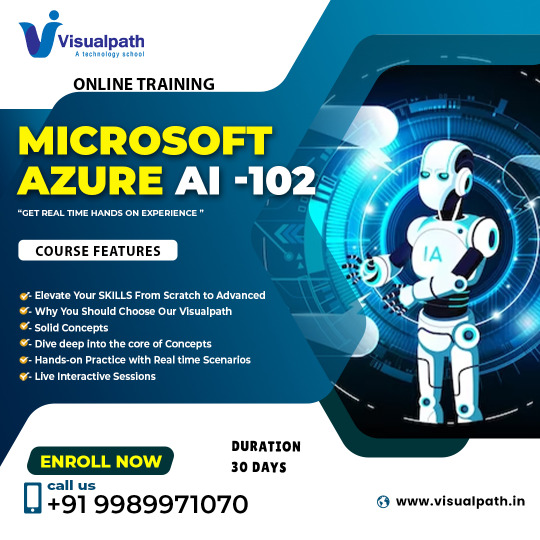
VisualPath in Hyderabad offers expert-led Azure AI Engineer Training to help you earn the AI-102 Certification. Our Azure AI-102 Online Course covers SQL Server, Data Science, Microsoft Azure, Generative AI, and Artificial Intelligence. With hands-on learning and real-world projects. Call +91-9989971070 to schedule your free demo session today
WhatsApp: https://www.whatsapp.com/catalog/919989971070/
Visit Blog: https://visualpathblogs.com/
Visit: https://www.visualpath.in/online-ai-102-certification.html
#Ai 102 Certification#Azure AI Engineer Certification#Azure AI Engineer Training#Azure AI-102 Course in Hyderabad#Azure AI Engineer Online Training#Microsoft Azure AI Engineer Training#AI-102 Microsoft Azure AI Training
0 notes
Text
Best Azure AI Engineer Training | Azure AI-102 Online Course
Deploying & Customizing Pre-Trained Models in Azure AI Services
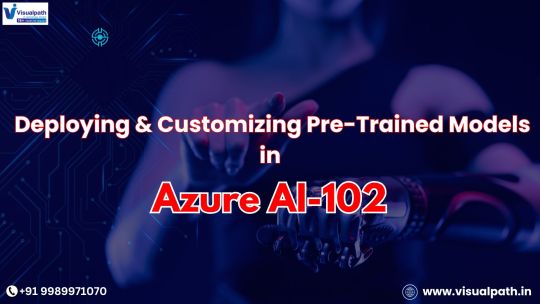
Introduction:
AI-102 Certification and looking to deepen your knowledge in deploying pre-trained models and customizing them through Azure AI services, you're in the right place. Azure AI Engineer Training is crucial for building and maintaining AI solutions on the Microsoft Azure platform. In this article, we will walk you through how to leverage pre-trained models, customize them, and deploy them within Azure AI services effectively. These capabilities play a vital role in creating powerful machine learning solutions, making it easier to implement AI functionality without starting from scratch.
What Are Pre-Trained Models in Azure AI?
Pre-trained models are machine learning models that have already been trained on large datasets and are optimized for specific tasks. These models are designed to handle tasks such as image recognition, natural language processing, and speech recognition. By leveraging pre-trained models, developers can save a significant amount of time, as they don't need to train models from scratch. These models come ready to use within Azure AI services like Azure Cognitive Services, which offer various APIs to integrate pre-trained capabilities into your applications.
Azure’s pre-trained models include services like:
Computer Vision: For image classification, object detection, and text extraction.
Speech: For speech recognition, speech translation, and speaker identification.
Language: For text analytics, sentiment analysis, language understanding (LUIS), and translation.
Custom Vision: A specialized service that allows users to train custom image classification models with minimal effort.
Why Use Pre-Trained Models in Azure AI?
The main advantage of using pre-trained models in Azure is their ability to expedite the AI development process. These models have already been trained on vast amounts of data, making them highly accurate and effective. They can help solve a wide range of problems across different industries, such as healthcare, finance, retail, and more. Azure AI Engineer Training equips professionals with the knowledge to effectively use these services to integrate pre-trained models into their applications.
Additionally, pre-trained models allow organizations to access state-of-the-art AI technology without the need for deep expertise in machine learning. With these models, developers can easily implement AI capabilities into their projects with just a few lines of code. As part of your AI-102 Microsoft Azure AI Training, you'll learn how to deploy and customize these models, ensuring that they meet your unique requirements.
Deploying Pre-Trained Models from Azure AI Services
When it comes to deploying pre-trained models, Azure provides several options. Azure AI Engineer Training covers these methods in detail, teaching you how to deploy models in both cloud and edge environments. Here’s how you can deploy pre-trained models in Azure:
Step 1: Choose the Right Pre-Trained Model
The first step in deploying a pre-trained model is selecting the one that fits your requirements. Azure Cognitive Services offers a variety of pre-built models tailored to specific tasks, such as vision, language, and speech. For instance, if you're building an application that needs to analyze customer feedback, the Text Analytics API might be a good fit. If your project requires image analysis, Computer Vision or Custom Vision would be ideal choices.
Step 2: Set Up Azure Resources
Once you’ve selected a model, the next step is to set up the necessary Azure resources, such as an Azure subscription, resource group, and the specific AI service. Depending on the service you’re using, you’ll need to create resources like Cognitive Services accounts, machine learning workspaces, or Azure Kubernetes Service (AKS) clusters for deploying models at scale.
Step 3: Integrate the Pre-Trained Model
With the Azure resources set up, you can now integrate the pre-trained model into your application. Azure provides SDKs for multiple programming languages, including Python, C#, and Java, to help you connect to Azure’s AI services easily. After integration, the model is ready to process input and generate predictions. For example, if you're using the Speech-to-Text API, the model can transcribe audio data into text.
Step 4: Monitor and Optimize the Deployment
Once deployed, it’s important to monitor the model’s performance in real time. Azure offers built-in monitoring tools like Azure Monitor to track key metrics such as response times, usage, and accuracy. Regular optimization ensures the model continues to deliver accurate results as your application scales.
Customizing Pre-Trained Models from Azure AI Services
While pre-trained models are powerful out of the box, there may be cases where you need to fine-tune them to better suit your specific use case. Azure AI services allow you to customize pre-trained models, making them adaptable to your needs. Customizing these models involves providing additional data to retrain them or modify their behaviour.
Customizing a Model in Azure
Collect Your Dataset: Gather a dataset that represents the unique scenarios of your application. For instance, if you're building a chatbot, you’ll need to gather examples of the phrases or questions users will ask.
Train the Model: Using Azure’s training tools, upload your data to the platform and begin training. This process involves adapting the model to learn patterns specific to your dataset.
Evaluate and Test: After training, evaluate the model to ensure its accurate and reliable. Azure provides testing tools that allow you to test your model’s predictions against known data.
Deploy the Custom Model: Once you're satisfied with the custom model’s performance, you can deploy it just like a pre-trained model.
Use Cases for Customizing Pre-Trained Models
Image Recognition: Fine-tuning pre-trained models to identify specific objects, such as brand logos or medical conditions.
Chatbots and Virtual Assistants: Customizing NLP models to better understand domain-specific jargon and user queries.
Sentiment Analysis: Adjusting language models to analyze customer feedback with a focus on industry-specific sentiments.
Conclusion
In conclusion, mastering how to deploy and customize pre-trained models is an essential skill for professionals aiming to earn the AI-102 Certification and pursue a career in Azure AI engineering. By using Azure AI Engineer Training and the tools provided by Microsoft Azure, you can effectively integrate pre-trained models into your applications, customize them for specific needs, and deploy them at scale. These skills will help you build efficient AI solutions that improve business processes, enhance user experiences, and provide valuable insights. As you progress in your AI-102 Microsoft Azure AI Training, you'll be better equipped to tackle real-world AI challenges and become an expert in Azure AI services.
Visualpath is the Best Software Online Training Institute in Hyderabad. Avail complete Azure AI (AI-102) worldwide. You will get the best course at an affordable cost.
Attend Free Demo
Call on - +91-9989971070.
WhatsApp: https://www.whatsapp.com/catalog/919989971070/
Visit Blog: https://visualpathblogs.com/
Visit: https://www.visualpath.in/online-ai-102-certification.html
#Ai 102 Certification#Azure AI Engineer Certification#Azure AI Engineer Training#Azure AI-102 Course in Hyderabad#Azure AI Engineer Online Training#Microsoft Azure AI Engineer Training#AI-102 Microsoft Azure AI Training
0 notes
Text
youtube
Mode of Training: Online
Contact us: +91 9989971070.
WhatsApp: https://www.whatsapp.com/catalog/919989971070/
Visit Blog: https://visualpathblogs.com/
Visit: https://www.visualpath.in/online-ai-102-certification.html
To subscribe to the Visualpath channel & get regular
updates on further courses: https://www.youtube.com/@VisualPathWatch demo video@ https://youtu.be/pvmOMKNIy8s?si=5t9pWbYreCK7W5Cr
#Ai 102 Certification#Azure AI Engineer Certification#Azure AI Engineer Training#Azure AI-102 Course in Hyderabad#Azure AI Engineer Online Training#Microsoft Azure AI Engineer Training#AI-102 Microsoft Azure AI Training#Youtube
0 notes
Text
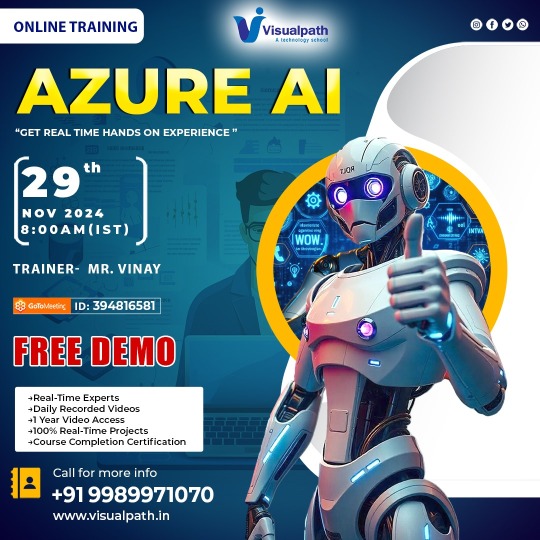
"Unlock the power of intelligent applications with Azure AI-102." Join our FREE DEMO to explore the possibilities.
JOIN link: https://meet.goto.com/394816581
Attend Online #FreeDemo from Visualpath on #AzureAI (102) by Mr. Vinay (Best Industry Expert).
Demo on: 29/11/2024 @8:00 AM IST
Contact us: +91 9989971070
WhatsApp: https://www.whatsapp.com/catalog/919989971070/
Visit Blog: https://visualpathblogs.com/
Visit: https://www.visualpath.in/online-ai-102-certification.html
#Ai 102 Certification#Azure AI Engineer Certification#Azure AI Engineer Training#Azure AI-102 Course in Hyderabad#Azure AI Engineer Online Training#Microsoft Azure AI Engineer Training#AI-102 Microsoft Azure AI Training
0 notes
Text

Join VisualPath's Azure AI Engineer Training for expert-led sessions, hands-on projects, and interview preparation. The globally accessible AI-102 Certification covers SQL Server, Data Science, Azure, Generative AI, and Artificial Intelligence. Gain practical skills to advance your career in AI and cloud technologies. Call +91-9989971070 for more details
WhatsApp: https://www.whatsapp.com/catalog/919989971070/Visit: https://www.visualpath.in/online-ai-102-certification.html
#Ai 102 Certification#Azure AI Engineer Certification#Azure AI Engineer Training#Azure AI-102 Course in Hyderabad#Azure AI Engineer Online Training#Microsoft Azure AI Engineer Training#AI-102 Microsoft Azure AI Training
0 notes
Text
Azure AI Engineer Training | Azure AI-102 Course in Hyderabad
Azure AI Engineer Training: Train and Deploy Machine Learning Models

Introduction:
Azure AI Engineer Training is a key step for professionals looking to enhance their expertise in training and deploying machine learning models with Azure. This certification focuses on empowering candidates to design, build, and manage intelligent solutions using Azure AI. By leveraging platforms like Azure Machine Learning, developers and engineers can integrate robust AI capabilities into applications, making them more efficient and responsive. This guide provides a comprehensive overview of how Azure AI supports the lifecycle of machine learning models while aligning with the requirements of AI 102 Certification and Microsoft Azure AI Engineer Training.
What Is Azure Machine Learning?
Azure Machine Learning is a cloud-based platform designed to streamline the development, training, and deployment of machine learning models. The platform offers tools for automating tasks, improving scalability, and integrating seamlessly with other Azure services. Key features include:
Automated Machine Learning (AutoML): Simplifies model selection and hyper parameter tuning.
Notebooks and Visual Interface: Supports both code-first and no-code environments.
Model Training: Provides GPU and CPU options for scalable training.
Model Deployment: Ensures models are production-ready with secure and scalable endpoints.
By mastering Azure Machine Learning through AI-102 Microsoft Azure AI Training, professionals can build intelligent applications and systems.
Steps to Train Machine Learning Models Using Azure
1. Set Up Azure Machine Learning Workspace
A workspace is the foundation for managing resources and experiments in Azure Machine Learning. To create one:
Navigate to the Azure portal.
Select Create a resource > AI + Machine Learning > Machine Learning.
Configure settings such as subscription, resource group, and workspace name.
This workspace acts as a centralized location for data storage, model training, and deployment, an essential skill covered in Azure AI Engineer Training.
2. Prepare and Upload Data
Data is a cornerstone of any machine learning model. Azure Machine Learning offers tools to pre-process and manage data efficiently. Steps include:
Data Cleaning: Address missing values, outliers, and inconsistencies.
Data Splitting: Divide data into training, validation, and testing sets.
Data Upload: Use Azure Blob Storage or datasets to import data into your workspace.
These tasks align with the objectives of Microsoft Azure AI Engineer Training, focusing on data preparation for robust AI solutions.
3. Train Models Using AutoML or Custom Code
Azure Machine Learning supports both automated and custom approaches to model training.
Using AutoML
AutoML automatically selects the best algorithms and hyper parameters:
Open your Azure Machine Learning workspace.
Select Automated ML > New Automated ML Run.
Upload your dataset and define the target column.
Configure the compute cluster and run the experiment.
Using Custom Code
For developers preferring more control, Azure Machine Learning allows custom Python or R scripts:
Use Jupiter notebooks or Visual Studio Code integrated with the Azure ML SDK.
Define a training script to specify the algorithm and parameters.
Execute the script on a scalable compute cluster.
Both approaches are part of the AI-102 Microsoft Azure AI Training curriculum, ensuring professionals gain hands-on experience.
4. Evaluate Model Performance
Evaluation is critical for ensuring model accuracy and reliability. Azure Machine Learning provides tools to generate metrics like accuracy, precision, recall, and F1 score. Use these metrics to:
Compare models.
Identify overfitting or under fitting.
Fine-tune hyper parameters for optimal performance.
Learning these evaluation techniques is a core aspect of Azure AI Engineer Training, enabling professionals to deliver high-quality solutions.
5. Deploy Machine Learning Models
Deploying a model makes it accessible for real-world applications. Azure supports multiple deployment options:
Real-Time Inference
Deploy models as REST endpoints for immediate predictions:
Register the model in your workspace.
Create a scoring script and environment file.
Deploy the model to Azure Kubernetes Service (AKS) or Azure Container Instances (ACI).
Batch Inference
For large-scale data processing, use Azure Batch AI:
Set up batch scoring pipelines.
Execute predictions on a scheduled basis.
Deployment processes covered in AI-102 Microsoft Azure AI Training ensure that professionals can handle various business requirements.
6. Monitor and Manage Models
Model monitoring ensures sustained performance and compliance:
Drift Detection: Identifies changes in data patterns.
Endpoint Monitoring: Tracks latency and throughput.
Retraining Pipelines: Automates retraining when performance degrades.
Such monitoring tools are integral to the Microsoft Azure AI Engineer Training, equipping professionals with skills to maintain AI solutions over time.
Benefits of Training with Azure Machine Learning
1. Scalability and Flexibility
Azure’s cloud infrastructure supports scalable computing resources, from CPUs to advanced GPUs, making it ideal for training large models.
2. Ease of Use
With AutoML and visual tools, Azure simplifies complex tasks, making AI accessible to both beginners and experts.
3. Integration with Azure Ecosystem
Azure Machine Learning integrates seamlessly with services like Azure Synapse Analytics and Power BI for end-to-end solutions.
4. Enterprise-Grade Security
Azure’s compliance with global standards ensures secure handling of sensitive data.
5. Career Advancement
Completing Azure AI Engineer Training enhances career opportunities in AI engineering, machine learning, and data science.
Conclusion
Training and deploying machine learning models with Azure Machine Learning offers unparalleled opportunities for building intelligent, scalable, and secure AI solutions. Whether you’re an aspiring data scientist or an experienced AI engineer, certifications like AI 102 Certification and Microsoft Azure AI Engineer Training provide a structured pathway to mastering these skills. From setting up a workspace to monitoring deployed models, the comprehensive training provided through Azure AI Engineer Training ensures professionals are well-prepared to tackle real-world challenges. Start your journey with AI-102 Microsoft Azure AI Training today and take the first step toward a successful AI career.
Visualpath is the Best Software Online Training Institute in Hyderabad. Avail complete Azure AI (AI-102) worldwide. You will get the best course at an affordable cost.
Attend Free Demo
Call on - +91-9989971070.
WhatsApp: https://www.whatsapp.com/catalog/919989971070/
Visit: https://www.visualpath.in/online-ai-102-certification.html
#Ai 102 Certification#Azure AI Engineer Certification#Azure AI Engineer Training#Azure AI-102 Course in Hyderabad#Azure AI Engineer Online Training#Microsoft Azure AI Engineer Training#AI-102 Microsoft Azure AI Training
0 notes
Text
Azure AI Engineer Training | Azure AI Engineer Online Training
Implement Computer Vision Solutions in Azure AI
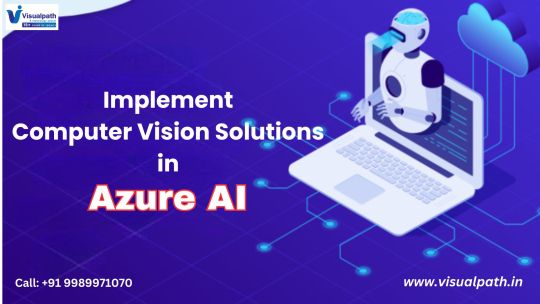
Introduction:
The AI 102 Certification is an essential step for professionals aspiring to excel in designing and implementing Microsoft AI solutions. As part of the Microsoft Azure AI Engineer Training, understanding computer vision capabilities is a critical aspect of delivering robust, intelligent solutions. This content will delve into computer vision's features, applications, and implementation in Azure AI. Additionally, we will explore how the Azure AI Engineer Training and AI-102 Microsoft Azure AI Training prepare candidates for real-world challenges.
What is Computer Vision in Azure AI?
Computer vision is a branch of artificial intelligence (AI) that enables systems to interpret visual inputs such as images and videos. Azure AI, through its Azure Cognitive Services, provides tools and APIs for building sophisticated computer vision applications. These services include:
Image Analysis: Extracts information such as objects, colours, and text from images.
Optical Character Recognition (OCR): Identifies and extracts text from images and documents.
Custom Vision: Allows businesses to build and train their own image recognition models.
Face API: Detects, identifies, and analyses facial features in images.
Video Indexer: Extracts insights from video content, including scene detection and emotion analysis.
The Azure AI Engineer Training ensures that learners gain hands-on experience with these tools, preparing them for practical deployment in diverse scenarios.
Why Use Azure AI for Computer Vision Solutions?
Azure AI offers a comprehensive and scalable platform for developing computer vision applications. Key benefits include:
Ease of Integration: Seamlessly integrates with existing workflows and systems.
Scalability: Azure AI solutions handle massive datasets, ensuring smooth performance.
Customization: Custom Vision allows organizations to tailor solutions to their specific needs.
Cost-Efficiency: Flexible pricing models make it accessible for businesses of all sizes.
The AI-102 Microsoft Azure AI Training equips learners with the skills to harness these benefits effectively.
Key Steps to Implement Computer Vision in Azure AI
1. Setting Up Your Azure Environment
Before developing computer vision applications, you must set up your Azure environment. This involves creating an Azure account and provisioning the required Cognitive Services resources. The AI 102 Certification curriculum includes practical guidance for this process.
2. Using Prebuilt Models
Azure provides prebuilt models for common tasks such as object detection and text extraction. These models are accessible through REST APIs or SDKs in programming languages like Python and C#. The Microsoft Azure AI Engineer Training focuses on integrating these APIs into applications seamlessly.
3. Training Custom Models with Custom Vision
The Custom Vision service enables businesses to create models tailored to their specific use cases. The process involves:
Uploading labelled datasets.
Training the model using Azure's machine learning capabilities.
Testing and iterating on the model to improve accuracy.
This hands-on approach is covered extensively in the Azure AI Engineer Training, providing learners with the expertise needed to deliver customized solutions.
4. Deploying Computer Vision Applications
Azure AI supports multiple deployment options, including:
Cloud Deployment: Host solutions on Azure for global accessibility.
Edge Deployment: Run applications locally on devices using Azure IoT Edge.
The AI-102 Microsoft Azure AI Training teaches candidates how to choose the appropriate deployment strategy for different scenarios.
Real-World Applications of Computer Vision in Azure AI
Retail Industry:
Automated inventory management.
Customer behaviour analysis using facial recognition.
Healthcare:
Medical imaging analysis for disease diagnosis.
Patient monitoring through video analytics.
Manufacturing:
Quality control using defect detection in production lines.
Predictive maintenance by analysing equipment performance.
Transportation:
Traffic monitoring and management.
Enhancing passenger safety with surveillance systems.
The Azure AI Engineer Training includes case studies and projects based on these applications, providing learners with industry-relevant experience.
Tools and Technologies in Azure AI for Computer Vision
Azure Machine Learning: Supports advanced model training and deployment.
Azure Data Lake: Enables large-scale data storage for training datasets.
Power BI: Integrates with computer vision solutions to provide actionable insights.
These tools are integral to the AI 102 Certification program, ensuring a holistic understanding of the Azure ecosystem.
Preparing for AI-102 Certification
The AI-102 Microsoft Azure AI Training curriculum is designed to provide comprehensive knowledge and practical experience in computer vision and other Azure AI capabilities. Key topics include:
Building and managing AI solutions.
Training and deploying machine learning models.
Integrating AI services into applications.
Conclusion
Implementing computer vision solutions with Azure AI empowers businesses to harness the potential of visual data for innovation and efficiency. From healthcare to transportation, the applications are limitless. The AI 102 Certification, along with the Azure AI Engineer Training, equips professionals with the expertise to design, deploy, and manage these solutions effectively. By leveraging the tools and technologies offered by Azure AI, certified professionals can drive transformative change in their organizations. Prepare for your journey today with AI-102 Microsoft Azure AI Training and advance your career with Microsoft Azure AI Engineer Training. The future of AI-driven innovation awaits.
Visualpath is the Best Software Online Training Institute in Hyderabad. Avail complete Azure AI (AI-102) worldwide. You will get the best course at an affordable cost.
Attend Free Demo
Call on - +91-9989971070.
WhatsApp: https://www.whatsapp.com/catalog/919989971070/
Visit: https://www.visualpath.in/online-ai-102-certification.html
#Ai 102 Certification#Azure AI Engineer Certification#Azure AI Engineer Training#Azure AI-102 Course in Hyderabad#Azure AI Engineer Online Training#Microsoft Azure AI Engineer Training#AI-102 Microsoft Azure AI Training
0 notes
Text

VisualPath in Hyderabad offers comprehensive Azure AI Engineer Training for the AI-102 Certification, featuring expert trainers and hands-on learning. The course covers SQL Server, Data Science, Microsoft Azure, Generative AI, and Artificial Intelligence. It includes real-world projects, interview preparation, and career support. Schedule a free demo today by calling +91-9989971070
WhatsApp: https://www.whatsapp.com/catalog/919989971070/
Visit: https://www.visualpath.in/online-ai-102-certification.html
#Ai 102 Certification#Azure AI Engineer Certification#Azure AI Engineer Training#Azure AI-102 Course in Hyderabad#Azure AI Engineer Online Training#Microsoft Azure AI Engineer Training#AI-102 Microsoft Azure AI Training
0 notes
Text
Best Azure AI Engineer Certification | Azure AI Engineer Online Training
What is Text Analytics, (LUIS), Translator Text Speech-to-Text, Text-to-Speech, & QnA Maker in Azure AI?

Introduction:
The AI-102 Certification is designed for professionals seeking to build intelligent AI solutions using Microsoft Azure. It focuses on various key components of Azure AI, including Text Analytics, Language Understanding (LUIS), Translator Text, Speech-to-Text, Text-to-Speech, and QnA Maker. These services play a pivotal role in enabling natural language processing (NLP), speech recognition, and conversational AI capabilities, which are crucial for developing cutting-edge AI-driven applications. In this content, we will explore these key services in Azure AI and explain how they contribute to the overall AI ecosystem.
1. Text Analytics in Azure AI
Text Analytics is one of the most widely used services in Azure AI, particularly for analyzing unstructured text data. It allows developers to extract valuable insights such as sentiment analysis, key phrase extraction, language detection, and named entity recognition. This service is critical for organizations looking to analyze large volumes of customer feedback, social media interactions, and other text-based data to derive actionable insights.
For example, a business can use Text Analytics to monitor customer sentiment on social media platforms. By identifying whether the feedback is positive, negative, or neutral, businesses can adjust their strategies in real time. Moreover, Text Analytics can be integrated with other Azure AI services to create comprehensive solutions for business intelligence.
Azure AI Engineer Training programs, including AI-102 Microsoft Azure AI Training, teach professionals how to implement and utilize Text Analytics for real-world applications. The service is easy to integrate into applications using REST APIs or SDKs, making it a versatile tool for developers seeking to enhance their AI-powered applications.
2. Language Understanding (LUIS) in Azure AI
Language Understanding (LUIS) is another cornerstone of Azure AI's natural language processing (NLP) services. LUIS helps developers create applications that can understand and process human language. LUIS works by extracting intents and entities from the input text, enabling the application to take specific actions based on user queries.
For instance, a customer service chatbot powered by LUIS can recognize user intent, such as “track my order” or “return a product,” and provide the correct response or initiate the appropriate action. This makes LUIS a critical tool for developing conversational AI systems that require language comprehension at scale.
Professionals enrolled in Microsoft Azure AI Engineer Training learn how to build and train custom language models using LUIS. With the growing demand for AI-based virtual assistants and chatbots across industries, skills in LUIS are highly sought after. AI-102 Microsoft Azure AI Training covers LUIS extensively, ensuring that professionals can create applications that enhance user experiences through intelligent language understanding.
3. Translator Text in Azure AI
Translator Text is a cloud-based service in Azure AI that enables real-time language translation. With support for over 60 languages, this service allows businesses to overcome language barriers and communicate effectively with a global audience. Whether translating website content, mobile app interfaces, or chatbot conversations, Translator Text makes it easy to localize digital products and services for different regions.
Translator Text is commonly used in applications requiring multilingual support. For example, e-commerce platforms can use Translator Text to automatically translate product descriptions and reviews for international customers. Moreover, businesses can integrate this service into their internal tools to facilitate cross-border collaboration among employees speaking different languages.
Azure AI Engineer Training emphasizes the importance of Translator Text in building AI-powered applications that serve global markets. In AI-102 Certification programs, developers learn to implement real-time translation capabilities using the Translator Text API, making it a valuable skill for AI engineers working in multinational environments.
4. Speech-to-Text and Text-to-Speech in Azure AI
Speech-to-Text and Text-to-Speech are crucial services in Azure AI for enabling voice interaction in applications. Speech-to-Text converts spoken language into written text, while Text-to-Speech converts text into lifelike speech. These services are fundamental for applications such as virtual assistants, voice-controlled devices, and accessibility tools for users with disabilities.
Speech-to-Text is widely used in industries like customer service, healthcare, and telecommunications. For instance, call centres can use Speech-to-Text to transcribe customer interactions for quality analysis or sentiment detection. Similarly, healthcare providers can use Speech-to-Text for medical dictation, streamlining the documentation process for physicians.
Text-to-Speech, on the other hand, finds its application in areas such as education, where it can be used to create audiobooks or reading aids for visually impaired users. Businesses can also use Text-to-Speech in interactive voice response (IVR) systems to improve customer service by delivering information in a natural-sounding voice.
AI-102 Certification programs cover both Speech-to-Text and Text-to-Speech services, teaching professionals how to integrate voice capabilities into their applications. Azure AI Engineer Training equips developers with the knowledge needed to create seamless voice-based interactions, which are becoming increasingly important in the AI-driven economy.
5. QnA Maker in Azure AI
QnA Maker is a no-code solution in Azure AI that allows developers to build conversational AI systems, such as chatbots, by automatically generating question-and-answer pairs from documents, FAQs, and knowledge bases. This service simplifies the process of creating AI-powered chatbots that can respond to customer queries based on pre-existing information.
For example, a company can use QnA Maker to build a virtual assistant that answers frequently asked questions about their products or services. The bot can pull responses directly from the company’s knowledge base, providing instant support to users without the need for human intervention.
QnA Maker is particularly useful for businesses looking to improve customer support and reduce operational costs. By automating responses to common inquiries, businesses can free up customer service representatives to focus on more complex issues.
In AI-102 Microsoft Azure AI Training, developers learn how to create and deploy QnA bots using QnA Maker. Azure AI Engineer Training focuses on building scalable solutions that enhance customer engagement through intelligent conversational agents. This service is a valuable addition to any developer’s toolkit, especially in industries where customer support is a key aspect of the business model.
Conclusion
In summary, the AI-102 Certification provides comprehensive training on Azure AI services, including Text Analytics, Language Understanding (LUIS), Translator Text, Speech-to-Text, Text-to-Speech, and QnA Maker. Each of these services plays a vital role in building intelligent applications that leverage natural language processing, speech recognition, and conversational AI technologies. By enrolling in Microsoft Azure AI Engineer Training, professionals can gain the skills needed to implement these services in real-world applications, ensuring they stay at the forefront of AI innovation.
For aspiring AI engineers, mastering these Azure AI services is essential to create solutions that improve business efficiency, enhance customer experience, and drive global innovation. The AI-102 Microsoft Azure AI Training equips professionals with the practical knowledge needed to build AI-driven applications that solve real-world problems, making it a crucial certification for anyone looking to excel in the field of AI engineering.
Visualpath is the Best Software Online Training Institute in Hyderabad. Avail complete Azure AI (AI-102) worldwide. You will get the best course at an affordable cost.
Attend Free Demo
Call on - +91-9989971070.
WhatsApp: https://www.whatsapp.com/catalog/919989971070/
Visit: https://www.visualpath.in/online-ai-102-certification.html
#Ai 102 Certification#Azure AI Engineer Certification#Azure AI Engineer Training#Azure AI-102 Course in Hyderabad#Azure AI Engineer Online Training#Microsoft Azure AI Engineer Training#AI-102 Microsoft Azure AI Training
0 notes
Text

VisualPath Institute in Hyderabad offers premier Azure AI Engineer Certification, focusing on online learning. Our courses are led by experienced industry experts who provide practical, hands-on training. The Azure AI Engineer Training is available globally, including in the USA, UK, Canada, Dubai, and Australia. For more information, call +91-9989971070
Course covers: SQL Server, Data Science, Microsoft Azure, Generative AI, Artificial intelligence,
WhatsApp: https://www.whatsapp.com/catalog/919989971070/
Visit: https://www.visualpath.in/online-ai-102-certification.html
#Ai 102 Certification#Azure AI Engineer Certification#Azure AI Engineer Training#Azure AI-102 Course in Hyderabad#Azure AI Engineer Online Training#Microsoft Azure AI Engineer Training#AI-102 Microsoft Azure AI Training
0 notes
Text
Azure AI Engineer Training | AI-102 Microsoft Azure AI Training
What are the Ethical Considerations for Building & Deploying Azure AI Solutions?
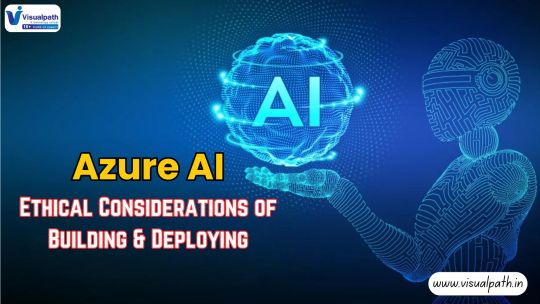
Introduction:
Azure AI Engineer Training emphasizes the importance of ethical considerations when building and deploying AI solutions. Key concerns include data privacy, ensuring that sensitive information is protected, and compliance with regulations like GDPR. Addressing bias in AI models is crucial to prevent discrimination, while transparency and explain ability help users trust AI decisions. Furthermore, accountability is essential, ensuring responsibility for AI outcomes. By focusing on these ethical principles, Azure AI engineers can create fair, transparent, and reliable AI systems that positively impact society. Ethics are central to responsible AI deployment in today's rapidly evolving technological landscape.
For professionals looking to gain expertise in this domain, programs such as AI 102 Certification are instrumental in providing a comprehensive understanding of both the technological and ethical aspects of AI. Ethical considerations in AI are essential to prevent unintended consequences, protect user privacy, avoid bias, and ensure AI systems are transparent and accountable. These considerations are especially important when leveraging powerful tools like those provided by Microsoft Azure, which plays a leading role in the AI space.
Data Privacy and Protection in AI
One of the core ethical considerations in AI is data privacy. AI systems are built on vast datasets, which often contain sensitive and personal information. During Azure AI Engineer Training, students learn that compliance with regulations like the General Data Protection Regulation (GDPR) and the California Consumer Privacy Act (CCPA) is critical when developing AI models. Azure provides various privacy tools, such as differential privacy and encryption protocols, to ensure that personal data is protected at all stages of AI development.
Ethically, AI developers need to handle data with care, ensuring it is anonymized and encrypted when necessary. This prevents unauthorized access and misuse of personal information. Privacy safeguards are an integral part of responsible AI deployment, and this is a key topic covered in the AI 102 Certification, where aspiring AI professionals learn how to navigate these challenges using Azure's built-in capabilities.
Addressing Bias and Fairness in AI Models
Bias in AI is a significant ethical challenge that can lead to unfair outcomes. AI models can unintentionally reinforce existing societal biases if they are trained on biased data. For example, facial recognition technologies have been criticized for their lack of accuracy across different demographic groups. In the Azure AI Engineer Training, participants are introduced to tools such as Fair learn, an Azure Machine Learning tool that helps detect and mitigate bias in models.
Ethically, it is crucial to ensure that AI models are fair and do not discriminate against any group. Azure provides extensive documentation and resources to guide developers in building fair AI systems. These considerations are emphasized in the AI 102 Certification curriculum, helping professionals understand the importance of fairness and inclusivity in AI solutions. Addressing bias is not just a technical challenge; it is an ethical imperative that shapes how society interacts with AI-powered technologies.
Transparency and Explain ability in AI
Another critical ethical consideration is the transparency and explain ability of AI models. Users and stakeholders need to understand how AI systems arrive at decisions, especially in high-stakes environments like healthcare, finance, and criminal justice. Black-box models, where decisions are made without clear reasoning, can erode trust in AI. Azure AI Engineer Training emphasizes the importance of model interpretability, offering tools such as Interpret, which provides insights into how AI models make predictions.
Ethical AI development involves creating systems that are explainable and transparent to all stakeholders. The AI 102 Certification ensures that professionals are well-equipped to use Azure tools for building AI models that offer clear explanations for their outputs. By focusing on transparency, developers can help build trust between AI systems and their users, ultimately leading to more responsible and accepted AI deployments.
Accountability in AI Systems
Accountability is another vital ethical concern. When AI systems make mistakes or produce harmful outcomes, it is essential to determine who is responsible. This accountability becomes especially complex in automated systems where human oversight is minimal. In Azure AI Engineer Training, developers are taught to integrate human-in-the-loop (HITL) processes, where humans remain involved in critical decision-making stages.
In the AI 102 Certification course, the focus on accountability ensures that AI engineers are equipped to implement systems where errors can be traced back, and corrective actions can be taken. This accountability framework also extends to maintaining audit trails, which are crucial for understanding the life cycle of an AI model and any decisions it has influenced. In this way, AI developers are held responsible for the outcomes of their systems, ensuring they adhere to ethical standards.
Ensuring Ethical Use of AI in Azure
Microsoft Azure promotes the responsible use of AI through its guidelines and tools that help developers design ethical solutions. The AI 102 Certification dives deep into these aspects, equipping AI engineers with the knowledge to apply Microsoft’s Responsible AI principles—fairness, inclusiveness, reliability and safety, privacy and security, transparency, and accountability—when building solutions on the Azure platform.
Throughout the Azure AI Engineer Training, students learn how to navigate the various challenges that come with AI development, including managing unintended consequences. Ethical AI also involves continuous monitoring and improvement, ensuring that AI systems evolve responsibly over time. This approach not only builds trust in AI technologies but also ensures that developers are equipped to handle future ethical challenges that may arise as AI becomes more sophisticated.
Conclusion
Ethical considerations are at the heart of building and deploying AI solutions on Microsoft Azure. Whether it is safeguarding data privacy, ensuring fairness, promoting transparency, or maintaining accountability, these principles are integral to developing responsible AI systems. The AI 102 Certification prepares professionals to navigate these ethical challenges by equipping them with the necessary tools and knowledge to create solutions that are both innovative and ethical. Through Azure AI Engineer Training, individuals gain the skills to build AI systems that not only meet business goals but also adhere to ethical standards, ensuring AI's positive impact on society. As AI continues to shape the future, it is the responsibility of AI professionals to ensure that these technologies are built with ethics in mind.
Visualpath is the Best Software Online Training Institute in Hyderabad. Avail complete Azure AI (AI-102) worldwide. You will get the best course at an affordable cost.
Attend Free Demo
Call on - +91-9989971070.
WhatsApp: https://www.whatsapp.com/catalog/919989971070/
Visit: https://www.visualpath.in/online-ai-102-certification.html
#Ai 102 Certification#Azure AI Engineer Certification#Azure AI Engineer Training#Azure AI-102 Course in Hyderabad#Azure AI Engineer Online Training#Microsoft Azure AI Engineer Training#AI-102 Microsoft Azure AI Training
0 notes
Text

VisualPath offers premier Azure AI Engineer Training, featuring experienced instructors and hands-on projects. Our online AI-102 Certification is available globally, including in the USA, UK, Canada, Dubai, and Australia. Gain practical skills and receive interview preparation to enhance your career. For more information, call +91-9989971070
Course covers: SQL Server, Data Science, Microsoft Azure, Generative AI, Artificial intelligence,
WhatsApp: https://www.whatsapp.com/catalog/919989971070/
Visit: https://www.visualpath.in/online-ai-102-certification.html
#Ai 102 Certification#Azure AI Engineer Certification#Azure AI Engineer Training#Azure AI-102 Course in Hyderabad#Azure AI Engineer Online Training#Microsoft Azure AI Engineer Training#AI-102 Microsoft Azure AI Training
0 notes
Text
Azure AI-102 Training in Hyderabad | Visualpath
Creating and Managing Machine Learning Experiments in Azure AI
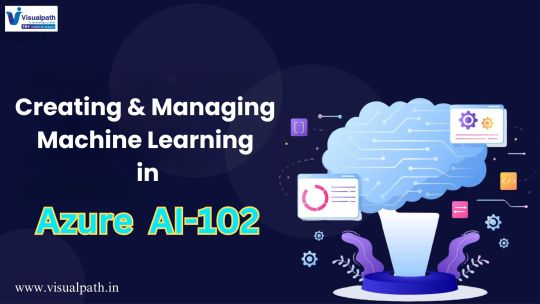
Introduction:
AI 102 Certification is a significant milestone for professionals aiming to design and implement intelligent AI solutions using Azure AI services. This certification demonstrates proficiency in key Azure AI functionalities, including building and managing machine learning models, automating model training, and deploying scalable AI solutions. A critical area covered in the Azure AI Engineer Training is creating and managing machine learning experiments. Understanding how to streamline experiments using Azure's tools ensures AI engineers can develop models efficiently, manage their iterations, and deploy them in real-world scenarios.
Introduction to Azure Machine Learning
Azure AI is a cloud-based platform that provides comprehensive tools for developing, training, and deploying machine learning models. It simplifies the process of building AI applications by offering pre-built services and flexible APIs. Azure Machine Learning (AML), a core component of Azure AI, plays a vital role in managing the entire machine learning lifecycle, from data preparation to model monitoring.
Creating machine learning experiments in Azure involves designing workflows, training models, and tuning hyper parameters. The platform offers both no-code and code-first experiences, allowing users of various expertise levels to build AI models. For those preparing for the AI 102 Certification, learning to navigate Azure Machine Learning Studio and its features is essential. The Studio's drag-and-drop interface enables users to build models without writing extensive code, while more advanced users can take advantage of Python and R programming support for greater flexibility.
Setting Up Machine Learning Experiments in Azure AI
The process of setting up machine learning experiments in Azure begins with defining the experiment's objective, whether it's classification, regression, clustering, or another machine learning task. After identifying the problem, the next step is gathering and preparing the data. Azure AI supports various data formats, including structured, unstructured, and time-series data. Azure’s integration with services like Azure Data Lake and Azure Synapse Analytics provides scalable data storage and processing capabilities, allowing engineers to work with large datasets effectively.
Once the data is ready, it can be imported into Azure Machine Learning Studio. This environment offers several tools for pre-processing data, such as cleaning, normalization, and feature engineering. Pre-processing is a critical step in any machine learning experiment because the quality of the input data significantly affects the performance of the resulting model. Through Azure AI Engineer Training, professionals learn the importance of preparing data effectively and how to use Azure's tools to automate and optimize this process.
Training Machine Learning Models in Azure
Training models is the heart of any machine learning experiment. Azure Machine Learning provides multiple options for training models, including automated machine learning (Auto ML) and custom model training using frameworks like Tensor Flow, PyTorch, and Scikit-learn. Auto ML is particularly useful for users who are new to machine learning, as it automates many of the tasks involved in training a model, such as algorithm selection, feature selection, and hyper parameter tuning. This capability is emphasized in the AI 102 Certification as it allows professionals to efficiently create high-quality models without deep coding expertise.
For those pursuing the AI 102 Certification, it's crucial to understand how to configure training environments and choose appropriate compute resources. Azure offers scalable compute options, such as Azure Kubernetes Service (AKS), Azure Machine Learning Compute, and even GPUs for deep learning models. Engineers can scale their compute resources up or down based on the complexity of the experiment, optimizing both cost and performance.
Managing and Monitoring Machine Learning Experiments
After training a machine learning model, managing the experiment's lifecycle is essential for ensuring the model performs as expected. Azure Machine Learning provides robust experiment management features, including experiment tracking, version control, and model monitoring. These capabilities are crucial for professionals undergoing Azure AI Engineer Training, as they ensure transparency, reproducibility, and scalability in AI projects.
Experiment tracking in Azure allows data scientists to log metrics, parameters, and outputs from their experiments. This feature is particularly important when running multiple experiments simultaneously or iterating on the same model over time. With experiment tracking, engineers can compare different models and configurations, ultimately selecting the model that offers the best performance.
Version control in Azure Machine Learning enables data scientists to manage different versions of their datasets, code, and models. This feature ensures that teams can collaborate on experiments while maintaining a history of changes. It is also crucial for auditability and compliance, especially in industries such as healthcare and finance where regulations require a detailed history of AI model development. For those pursuing the AI 102 Certification, mastering version control in Azure is vital for managing complex AI projects efficiently.
Deploying and Monitoring Models
Once a model has been trained and selected, the next step is deployment. Azure AI simplifies the process of deploying models to various environments, including cloud, edge, and on-premises infrastructure. Through Azure AI Engineer Training, professionals learn how to deploy models using Azure Kubernetes Service (AKS), Azure Container Instances (ACI), and Azure IoT Edge, ensuring that models can be used in a variety of scenarios.
Monitoring also allows engineers to set up automated alerts when a model's performance falls below a certain threshold, ensuring that corrective actions can be taken promptly. For example, engineers can retrain a model with new data to ensure that it continues to perform well in production environments. The ability to manage model deployment and monitoring is a key skill covered in Azure AI Engineer Training, and it is a critical area of focus for the AI 102 Certification.
Best Practices for Managing Machine Learning Experiments
To succeed in creating and managing machine learning experiments, Azure AI engineers must follow best practices that ensure efficiency and scalability. One such practice is implementing continuous integration and continuous deployment (CI/CD) for machine learning models. Azure AI integrates with DevOps tools, enabling teams to automate the deployment of models, manage experiment lifecycles, and streamline collaboration.
Moreover, engineers should optimize the use of computer resources. Azure provides a wide range of virtual machine sizes and configurations, and choosing the right one for each experiment can significantly reduce costs while maintaining performance. Through Azure AI Engineer Training, individuals gain the skills to select the best compute resources for their specific use cases, ensuring cost-effective machine learning experiments.
Conclusion
In conclusion, creating and managing machine learning experiments in Azure AI is a key skill for professionals pursuing the AI 102 Certification. Azure provides a robust platform for building, training, and deploying models, with tools designed to streamline the entire process. From defining the problem and preparing data to training models and monitoring their performance, Azure AI covers every aspect of the machine learning lifecycle.
By mastering these skills through Azure AI Engineer Training, professionals can efficiently manage their AI workflows, optimize model performance, and ensure the scalability of their AI solutions. With the right training and certification, AI engineers are well-equipped to drive innovation in the rapidly growing field of artificial intelligence, delivering value across various industries and solving complex business challenges with cutting-edge technology.
Visualpath is the Best Software Online Training Institute in Hyderabad. Avail complete Azure AI (AI-102) worldwide. You will get the best course at an affordable cost.
Attend Free Demo
Call on - +91-9989971070.
WhatsApp: https://www.whatsapp.com/catalog/919989971070/
Visit: https://www.visualpath.in/online-ai-102-certification.html
#Ai 102 Certification#Azure AI Engineer Certification#Azure AI Engineer Training#Azure AI-102 Course in Hyderabad#Azure AI Engineer Online Training#Microsoft Azure AI Engineer Training#AI-102 Microsoft Azure AI Training
0 notes
Text

VisualPath offers the top Azure AI Engineer Certification, led by industry experts. Gain practical experience through our Azure AI Engineer Training and get ready for interviews. Our global training is available in India, the USA, the UK, Canada, Dubai, and Australia. Contact us at +91-9989971070
Course covers: SQL Server, Data Science, Microsoft Azure, Generative AI, Artificial intelligence,
WhatsApp: https://www.whatsapp.com/catalog/919989971070/
Visit: https://www.visualpath.in/online-ai-102-certification.html
#Ai 102 Certification#Azure AI Engineer Certification#Azure AI Engineer Training#Azure AI-102 Course in Hyderabad#Azure AI Engineer Online Training#Microsoft Azure AI Engineer Training#AI-102 Microsoft Azure AI Training
0 notes